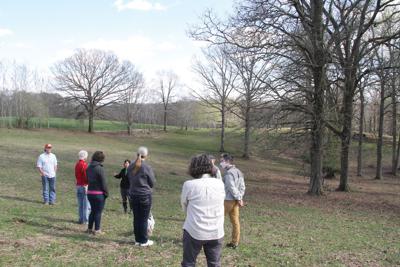Co-housing — and its various flavors and offshoots — is a new name for an old concept. Planned by their future residents rather than by developers, at their core, co-housing projects are single-family homes grouped around communal space. Early buy-in from residents, consensus-based decision-making and architectural and planning decisions — front porches opening onto carless streets, for example — are intended to foster a sense of community increasingly absent in a siloed society.
The idea almost has a pioneer spirit behind it: like-minded folks setting out to make their way in a new place together — bound together for reasons of safety and necessity, yes, but striving for the higher levels of Maslow’s famous pyramid.
Intentional communities, as academics tend to label them, have a long history in Tennessee. The Farm in Summertown, founded by counterculturists in the 1970s, is perhaps the most famous example. But that followed several 19th-century projects, like the abolitionist, egalitarian Nashoba outside of Memphis, the charmingly English Rugby on the Upper Cumberland Plateau and the semi-socialist Ruskin in Dickson County.
There are communes in Cannon County. In DeKalb County, there’s the Agape Community, a dwindling Russian Orthodox collective. Former company towns — Alcoa, for example — could meet the definition. Heck, even Oak Ridge probably does in a broad sense.
The point is, people get into intentional communities for a host of reasons: disenchantment, religion, fresh starts, nuclear weapons development.
Maybe communal living doesn’t suit the American spirit, but the human spirit craves community.
And the human body needs fresh air and food. That’s where agrihoods come to fill the breach.
An agrihood is a single-family, multifamily or mixed-use community built with a working farm or community garden as a focus, according to the Urban Land Institute. It affords residents the opportunity to be involved in agriculture as much as they’d like to be while providing fresh foods. They are increasingly popular in exurbs around major cities, as they help preserve farmland threatened by sprawl. Think of it as next-level farm-to-table living.
And a group of Tennesseans thinks they’ve found the perfect place for such a project.
Burns is a small town about 35 miles west of Nashville, flush against the southwest corner of Montgomery Bell State Park and just east of Dickson.
It’s a fecund area — part of the Black Patch of the late-19th and early-20th century, where the dark soil produced much of the nation’s tobacco. It’s crisscrossed by creeks with charming names: Beaverdam, Billy Richardson, Gum Branch. And if the folks behind the project hit their target, Burns will be the home of Burns Village & Farm by early 2024.
A core group of early adopters have 15 acres of a large family farm under contract. With enough buy-in, they plan an agrihood of 28 to 35 homes centered around a farm, managed and operated by professionals but with opportunities for residents to chip in.
The Deal family, which owns the farm, has been in the area a long time — long enough that there’s a Deal Road southwest of town. And they know what can happen to family farms.
“Several of us in the family have careers in the building industry and are familiar with the traditional subdivision method of breaking up the ‘family farm,’ ” the Deals say in a statement. “We have chosen not to split up the land and sell it off to a track home development.”
The farm has been in the family for generations, and the Deals see this as a way to save and preserve it against economic pressures to subdivide.
But there’s still a lot of work to be done.
For starters, the community needs more members. A kickoff weekend is scheduled for April 29 through May 1, beginning with a free intro-to-co-housing presentation at 6 p.m. April 29 at The Nashville Food Project. That will be led by Kathryn McCamant, a consultant for Burns Village and co-author of several books on co-housing, including Cohousing: A Contemporary Approach to Housing Ourselves, considered the seminal work on the movement. A workshop will follow on April 30 and May 1. Registration and more information is available at burnsvillagefarm.com.
The final costs of the project are still unclear. The homes won’t be designed until there are enough future residents, and there’s a whole manner of infrastructure, utilities and planning hoops to take care of. Nevertheless, the two-year timeline is a reachable goal based on earlier such projects, including Germantown Commons in Nashville, the state’s first co-housing project.
It’s telling — maybe a bit chilling, even — that Americans have become so disconnected to the agriculture that feeds us that we had to coin a new word for one of the oldest living arrangements in human society. But a new way of living may re-form those bonds.
Taking a look at co-housing agrihoods, disaster preparedness and recovery, local eco-friendly businesses and services, and more






